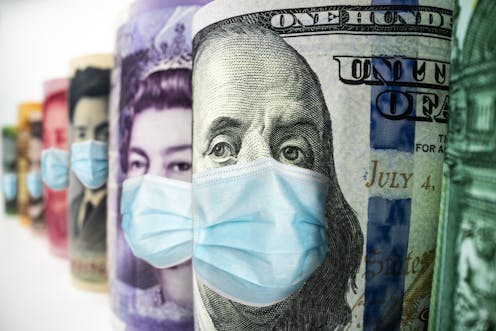How government payments to the vulnerable can multiply to create economic growth for everyone
- Written by Conrad Nunnenmacher, PhD Research Fellow in Innovation, Economics, Governance and Sustainable Development, United Nations University

The economic fallout of COVID-19 left people around the world facing a significant threat to their livelihood. As governments scrambled to mitigate the pandemic’s impact on their populations, many decided to use direct payments to support vulnerable citizens.
More than a sixth[1] of the world’s population received some sort of cash transfer in 2020. These programmes were a key source of support for many people during the COVID-19 pandemic, with governments across the globe scaling up or introducing such payments.
Brazil, for example, introduced the Auxílio Emergencial[2] programme, while the US implemented Economic Impact Payments[3]. Both cash transfer programmes aimed to shield vulnerable populations. This was also not exclusive to middle- and high-income countries. Togo, for instance, implemented the Novissi[4] cash transfer programme during the pandemic.
Using cash payments to protect people’s livelihoods and lift the poor out of poverty is not a novel strategy[5]. It can be a simple way to provide basic social protection to people in need, helping citizens to withstand sudden shocks and also facilitating their recovery after a crisis.
Cash assistance as financial burden?
But cash transfers still attract a lot of debate. Besides typical concerns like creating dependency and reducing labour supply[6], these programmes are costly. This can cause concern about their sustainability and hinder the initial implementation and scale-up.
For example, the Social Assistance Grants for Empowerment programme in Uganda in 2010 became so politicised[7] that it was challenged every step of the way to its implementation and later expansion. Even before its pilot programme, concerns[8] regarding its financial sustainability and the potential creation of welfare dependencies were raised by politicians.
During periods of economic crisis, austerity policies can also directly influence social assistance initiatives. After the 2010 economic crisis, for example, Greece initially suspended and subsequently terminated its housing benefit programme, attributing this decision to budget constraints[9].
But cash transfer programmes aren’t “handouts”. The positive impacts on the people that receive them are well documented[10]. They are powerful instruments for strengthening household resilience[11] and fostering opportunities that can extend beyond the immediate recipients[12].
The multiplier effect
There is another vital element of social cash transfers that most people aren’t aware of: the economic multiplier effect. In a recent study[13] with Ugo Gentilini, Giorgia Valleriani and Yuko Okamura of the World Bank, and Giulio Bordon of the UN’s International Labour Organization, we found the multiplier effect can greatly enhance the financial sustainability of social cash transfer programmes.
The core concept is that every dollar transferred that is spent rather than saved can increase the total income in the economy beyond its original value.
Consider a smallholder farmer who uses some of her grant to buy fertiliser at the local market. The local merchant profits from it and then spends this additional income, increasing profits for someone else and setting off a ripple effect through the economy. These taxable gains go beyond the people that get the payment, effectively “multiplying” the original grant’s worth for the economy.
Investing in the entire economy
We reviewed 23 studies[15] of 19 cash assistance programmes across 13 countries and found substantial evidence of this multiplier effect from social cash transfers.
In Brazil, for example, Bolsa Família, the current national social welfare programme of Brazil and one of the largest cash transfer programmes in the world, was found to increase real GDP per R$1 (£0.16) spent by R$1.04[16]. This is a small but positive spillover into the Brazilian economy.
Another noteworthy example is the GiveDirectly initiative in rural western Kenya, a pilot programme that offered a US$1,000 (£791) one-off transfer to 10,500 poor households. This programme led to a strong positive economic shock with a multiplier of 2.5 per US$1[17]. So, every US$1 transferred generated a value of US$2.50 locally – a strong positive spillover to the local economy.
Social cash transfers have the potential to not only support the poor and vulnerable, but also to stimulate the wider economy. Rather than simply accepting the general perception of social transfers as an expense, we should start recognising their true value as an investment in a country’s entire economy.
References
- ^ More than a sixth (openknowledge.worldbank.org)
- ^ Auxílio Emergencial (documents.worldbank.org)
- ^ Economic Impact Payments (www.cbpp.org)
- ^ Novissi (poverty-action.org)
- ^ not a novel strategy (academic.oup.com)
- ^ reducing labour supply (izajodm.springeropen.com)
- ^ so politicised (onlinelibrary.wiley.com)
- ^ concerns (onlinelibrary.wiley.com)
- ^ budget constraints (library.fes.de)
- ^ well documented (www.cambridge.org)
- ^ household resilience (voxdev.org)
- ^ immediate recipients (link.springer.com)
- ^ study (documents.worldbank.org)
- ^ Bruno Cesar Spada/Shutterstock (www.shutterstock.com)
- ^ reviewed 23 studies (documents.worldbank.org)
- ^ R$1.04 (www.gtap.agecon.purdue.edu)
- ^ 2.5 per US$1 (onlinelibrary.wiley.com)







